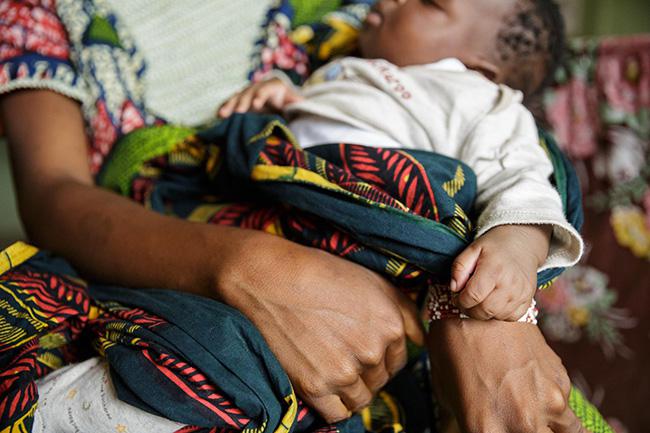
Early infant diagnosis is essential for saving the lives of HIV-positive babies. But in Sierra Leone’s Kenema Government Hospital, out-of-date testing kits meant that health professionals like Gladys Gassama often had to wait until children were 12 months old to determine their HIV status. Last year, with support from UNICEF and the EU, the hospital received a Polymerase Chain Reaction (PCR) machine, which allows Gladys to test a child’s HIV status at birth and start life-saving antiretroviral treatment immediately.
On a sunny day eastern Sierra Leone, Gladys Gassama gently welcomes a middle aged woman into her counselling room with a broad smile.
Gladys is an HIV counsellor at the Kenema Government Hospital who, along with four other health workers in the district, was trained last year on early infant diagnosis of HIV. About 138 health workers from across Sierra Leone have been taught the methodology so far, thanks to the National AIDS Control Programme, supported by UNICEF and the European Union. One year on, we went back to see how the training was being put to good use.
“They trained us on new skills to collect blood samples, package them and take good care of them before they reach their final destinations”, Gladys said.
“Before, we waited till they are 12 months old to know the HIV status of babies because the test kits we used were not up-to-date; they gave out results very slowly”, she added. “Now the results are very fast!”
Life-saving early diagnosis
Gladys and her colleagues are ecstatic about the introduction of the new Polymerase Chain Reaction (PCR) machine because “it detects the virus very quickly”. This machine, which was also procured with European Union funding, can determine the HIV status of babies from birth. This is in sharp contrast to a year ago, when PCR was not available in Sierra Leone and HIV status could not be determined until a child was at least 12 months old.
While prevention of mother-to-child transmission services significantly reduces the number of children contracting HIV, it is essential for all children who are exposed to HIV to be tested so that children who are identified as being HIV-positive are able to access the treatment that will keep them alive and healthy.
“If these babies are not diagnosed early, they may die early”, Gladys said. “This new machine picks up the virus in young babies as early as possible without doubt.”
According to figures from the National AIDS Secretariat, Sierra Leone has an HIV prevalence rate of 1.5 per cent. To prevent new infections, the National AIDS Secretariat, with support from UNICEF, employs to key strategies: the elimination of mother-to-child transmission and early infant diagnosis.
“Our aim is to protect babies”, Gladys said. “Even if the baby turns out to be [HIV] positive, we put it on early treatment and medication so that it can still live. And as health care workers, we feel motivated to do a good job.”
In Kenema, the training has already made a potentially life-saving intervention in one baby’s life who tested positive. The PCR machine detected the result quickly and the baby was put on immediate medication and regular follow up.
Essential treatment for children
In Sierra Leone, all children living with HIV can be enroled in antiretroviral treatment free of charge. However only 13.5 per cent of children estimated to be living with HIV have been enroled in treatment. Infants and children who are HIV-positive are not being identified early enough to put them on life-saving treatment.
To close this paediatric treatment gap, UNICEF is working with the National AIDS Secretariat and the National AIDS Control Programme to scale up early infant diagnosis so that all newborns are tested within the first six weeks of life, and paediatric cases are identified through proven interventions, such as routine HIV screening for all children with severe acute malnutrition.
“We feel that we are doing good work and we are proud of that. We observe all the protocols and never received negative feedback from our bosses”, Gladys said.
According to Gladys, parents now feel motivated to take their babies to the hospital for, among other things, early infant diagnosis.
“I am very thankful to the European Union for providing the funds and UNICEF for facilitating. We would like to see this training being extended to more health workers so that more people could benefit from it.”
The EU and UNICEF work in partnership in Sierra Leone to improve maternal and child health, including through support to the Free Health Care Initiative, which offers free essential drugs to children under 5, and pregnant and breastfeeding mothers.
Source: UNICEF
 FR
FR EN
EN AR
AR








